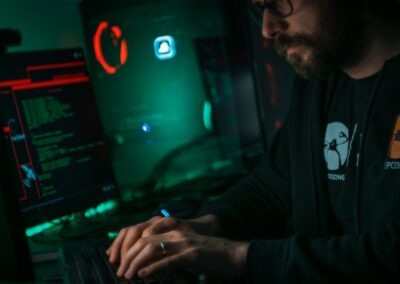Reducing the Risk of Identity Theft and Fraud through Enhanced Security
Implementing Biometric Data Protection in Saudi Arabia and the UAE
The implementation of biometric data protection measures is crucial for reducing the risk of identity theft and fraud. In technologically advanced regions like Saudi Arabia and the UAE, the use of biometric data for identification purposes is becoming increasingly common. This data, which includes fingerprints, facial recognition, and iris scans, provides a high level of security but also necessitates stringent protection measures to prevent misuse and ensure privacy.
Saudi Arabia, under its Vision 2030 initiative, is embracing digital transformation across various sectors. As biometric data becomes integral to services like banking, healthcare, and government, the need for robust protection measures has never been greater. The Saudi Data and Artificial Intelligence Authority (SDAIA) has been proactive in establishing regulations that mandate the secure handling of biometric data. These measures include encryption, access controls, and regular audits to ensure that personal information is safeguarded against unauthorized access and cyber threats.
Similarly, the UAE has been a pioneer in adopting biometric technology for enhancing security and convenience. From smart gates at airports to biometric authentication for banking services, the use of biometric data is widespread. The UAE’s data protection laws, such as the Federal Decree-Law No. 45 of 2021 on the Protection of Personal Data, provide a comprehensive framework for ensuring the security of biometric information. By adhering to these regulations, organizations in the UAE can mitigate risks and maintain user trust in biometric systems.
Advanced Technologies in Enhancing Biometric Data Protection
Modern technologies, including Artificial Intelligence (AI) and Blockchain, play a pivotal role in enhancing biometric data protection. These technologies offer innovative solutions to address the challenges of securing biometric information and preventing identity theft and fraud.
In Saudi Arabia, AI is being utilized to strengthen biometric data protection strategies. AI algorithms can detect anomalies in biometric data usage, such as unusual login patterns or unauthorized access attempts, and respond in real-time to potential threats. By integrating AI-driven security systems, businesses and government entities can enhance their ability to protect biometric information and comply with data protection regulations. This proactive approach is vital for maintaining trust and safeguarding user data.
Blockchain technology also offers promising applications for biometric data protection in the UAE. Blockchain’s decentralized and immutable nature provides a secure framework for managing biometric information. By recording biometric data transactions on a blockchain, organizations can ensure that this data is tamper-proof and transparent. Integrating blockchain into biometric systems enhances data integrity and security, providing an additional layer of protection against cyber threats and unauthorized access.
Executive Coaching and Leadership in Biometric Data Protection
Effective leadership and executive coaching are crucial for the successful implementation of biometric data protection measures. Leaders play a critical role in fostering a culture of security and compliance within their organizations, ensuring that biometric data protection is prioritized at all levels.
In Saudi Arabia, executive coaching programs are increasingly emphasizing the importance of biometric data protection. By training leaders to understand and implement robust security measures, organizations can ensure that their biometric systems align with regulatory requirements. This focus on data protection not only safeguards biometric information but also enhances the organization’s reputation and trustworthiness in the digital marketplace.
Similarly, in the UAE, leadership development initiatives are incorporating biometric data protection strategies into their curricula. By equipping executives with the knowledge and skills to manage biometric security effectively, businesses can navigate the complexities of biometric data protection with confidence. This approach ensures that biometric protection measures are integrated into all aspects of the organization’s operations, promoting a culture of security and compliance.
Blockchain, The Metaverse, and Biometric Data Protection
Blockchain and The Metaverse offer innovative solutions for enhancing biometric data protection. These technologies provide new opportunities for securing biometric information and ensuring compliance with data protection regulations.
In Dubai, the integration of blockchain technology with biometric systems is being explored to enhance data security. Blockchain’s ability to provide transparent and tamper-proof records of biometric transactions offers a secure solution for managing biometric information. By incorporating blockchain into biometric systems, businesses can address data protection challenges and ensure the integrity of their biometric data.
The Metaverse, an immersive digital environment, also presents new possibilities for biometric data protection. In Saudi Arabia, businesses are exploring the potential of The Metaverse to create secure virtual spaces for biometric authentication and identity verification. By implementing robust biometric data protection measures within The Metaverse, companies can enhance the security of their digital platforms and provide users with a safe and trusted digital experience.
Conclusion
The implementation of biometric data protection measures is essential for reducing the risk of identity theft and fraud. In regions like Saudi Arabia and the UAE, these measures are crucial for building trust and ensuring the security of sensitive biometric information in the digital realm.
By integrating advanced technologies such as AI and Blockchain with biometric data protection strategies, businesses and government entities can enhance their security measures and comply with regulatory requirements. Executive coaching and leadership development play a vital role in ensuring that these measures are effectively implemented, promoting a culture of security and compliance within organizations.
As Saudi Arabia and the UAE continue to lead in technological innovation, the focus on biometric data protection will be crucial for supporting sustainable growth and fostering a secure digital environment. Embracing innovative solutions such as blockchain and The Metaverse can further enhance biometric data protection efforts, ensuring that personal information is safeguarded in the evolving digital landscape.
#biometricdata #dataprotection #identitytheft #fraudprevention #digitalsecurity #AIethics #SaudiArabia #UAE #Riyadh #Dubai #ArtificialIntelligence #Blockchain #TheMetaverse #executivecoaching #GenerativeAI #leadershipskills #projectmanagement























